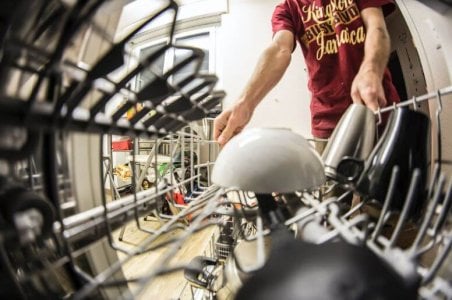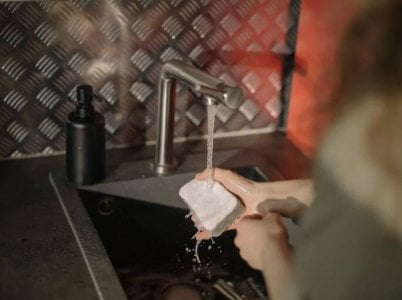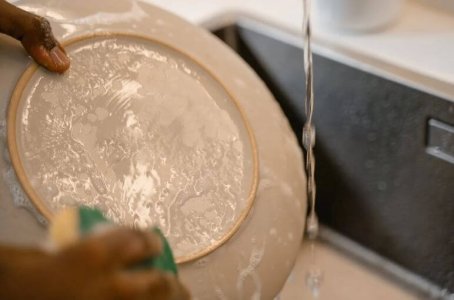Are you making these five costly dishwashing mistakes?
- Replies 9
For many people, washing the dishes after every meal is a tedious and time-consuming chore.
But even if you’re tired, it is still important to be mindful of the way you wash your dishes.
According to Curtin University Associate Professor Barbara Mullan, there are several common mistakes people make when they're washing dishes that could be potentially harmful to their health.
‘Ultimately, if you leave dirty dishes around and there are people in the house, and possibly animals, they are likely to spread bacteria around,’ the professor said.
She added that bacteria will stay alive on surfaces (even on clean surfaces!) for up to four days.
So, what are these common dishwashing mistakes? Let’s dive into them one by one.
Mistake #1: You put off doing the dishes.
While this is not a direct ‘cleaning’ mistake, it does affect how you clean your dishes. Doing the dishes is not a chore most people enjoy – although, I personally like doing them because it takes my mind off of things – but the longer you leave your dirty dishes in the sink, the more chances you have of spreading germs in your home.
Cold viruses can live on your hands and other surfaces like cups, plates, and cutlery for up to 24 hours.
Mistake #2: You use a dirty sponge.
Just because your sponge looks clean doesn’t mean that it is. Unfortunately, sponges need to be changed quite often. Even if you sanitise them in boiling water (as referenced by this study), there’s no way to get rid of all the harmful bacteria that live on and thrive in your wet sponge.
In the same study, researchers said to replace sponges every week. Although costly, you can always buy bulk sponge packs. This jumbo pack of 6 sponges from Kmart will cost you $4.50.
Mistake #3: You soak items that shouldn’t be soaked.
Professor Mullan said that while soaking helps to remove stubborn bits of food, it’s not a good idea to fill up your sink and let your dishes soak before washing them because you’re encouraging bacteria to multiply. Especially on certain items, like cast-iron cookware or anything made from wood.
‘You’re putting dishes into water temperature under 60 degrees, which is the perfect breeding ground for bacteria.’
Mistake #4: You use too much soap.
Soap-suds mean more build-up which means it will be harder to rinse your dishes. This also happens when you wash clothes. We wrote about the common mistakes one can make while cleaning washing machines, which you can find here.
Additionally, soap residue will remain on your dishes if you’re not careful. This can make you sick in the long run.
Mistake #5: You put the dishes away while they are still wet.
Never make the mistake of putting your dishes back in the cupboard while they’re still wet. This adds moisture to your drawers or cupboards and becomes a breeding ground for mould.
Towel or air dry your plates and cutlery before placing them back in your drawer.
When it comes to keeping your kitchen free of bacteria and germs, it’s not just about washing your dishes. You should also invest in proper hygiene practices, such as regularly cleaning surfaces and keeping food stored safely.
Here are some tips to keep your kitchen clean:
 Did this make you think twice about washing dishes? Let us know in the comments below and don’t forget to share any tips and tricks you use while scrubbing up dishes in the kitchen!
Did this make you think twice about washing dishes? Let us know in the comments below and don’t forget to share any tips and tricks you use while scrubbing up dishes in the kitchen!
But even if you’re tired, it is still important to be mindful of the way you wash your dishes.
According to Curtin University Associate Professor Barbara Mullan, there are several common mistakes people make when they're washing dishes that could be potentially harmful to their health.
‘Ultimately, if you leave dirty dishes around and there are people in the house, and possibly animals, they are likely to spread bacteria around,’ the professor said.
She added that bacteria will stay alive on surfaces (even on clean surfaces!) for up to four days.
So, what are these common dishwashing mistakes? Let’s dive into them one by one.
Mistake #1: You put off doing the dishes.
While this is not a direct ‘cleaning’ mistake, it does affect how you clean your dishes. Doing the dishes is not a chore most people enjoy – although, I personally like doing them because it takes my mind off of things – but the longer you leave your dirty dishes in the sink, the more chances you have of spreading germs in your home.
Cold viruses can live on your hands and other surfaces like cups, plates, and cutlery for up to 24 hours.
Mistake #2: You use a dirty sponge.
Just because your sponge looks clean doesn’t mean that it is. Unfortunately, sponges need to be changed quite often. Even if you sanitise them in boiling water (as referenced by this study), there’s no way to get rid of all the harmful bacteria that live on and thrive in your wet sponge.
In the same study, researchers said to replace sponges every week. Although costly, you can always buy bulk sponge packs. This jumbo pack of 6 sponges from Kmart will cost you $4.50.
Mistake #3: You soak items that shouldn’t be soaked.
Professor Mullan said that while soaking helps to remove stubborn bits of food, it’s not a good idea to fill up your sink and let your dishes soak before washing them because you’re encouraging bacteria to multiply. Especially on certain items, like cast-iron cookware or anything made from wood.
‘You’re putting dishes into water temperature under 60 degrees, which is the perfect breeding ground for bacteria.’
Mistake #4: You use too much soap.
Soap-suds mean more build-up which means it will be harder to rinse your dishes. This also happens when you wash clothes. We wrote about the common mistakes one can make while cleaning washing machines, which you can find here.
Additionally, soap residue will remain on your dishes if you’re not careful. This can make you sick in the long run.
Mistake #5: You put the dishes away while they are still wet.
Never make the mistake of putting your dishes back in the cupboard while they’re still wet. This adds moisture to your drawers or cupboards and becomes a breeding ground for mould.
Towel or air dry your plates and cutlery before placing them back in your drawer.
When it comes to keeping your kitchen free of bacteria and germs, it’s not just about washing your dishes. You should also invest in proper hygiene practices, such as regularly cleaning surfaces and keeping food stored safely.
Here are some tips to keep your kitchen clean:
- Keep your countertops clear of unnecessary items to avoid clutter.
- Clean up messes immediately to prevent the spread of bacteria.
- Clean every surface, including stove and oven knobs, the face of your microwave, oven, and other appliances.
- Clean the sink after washing the dishes, since this area can host bacteria, including E.coli and salmonella.
- Change your dish towels regularly.
Key Takeaways
- Professor Barbara Mullan shared the common mistakes people make while washing dishes.
- She said that doing the dishes takes less time than people think and leaving them around longer can spread germs.
- Sponges need to be changed at least once a week.
- Soaking certain items (like cast iron cookware) is not a good idea, as it can create an environment for bacteria to thrive.










